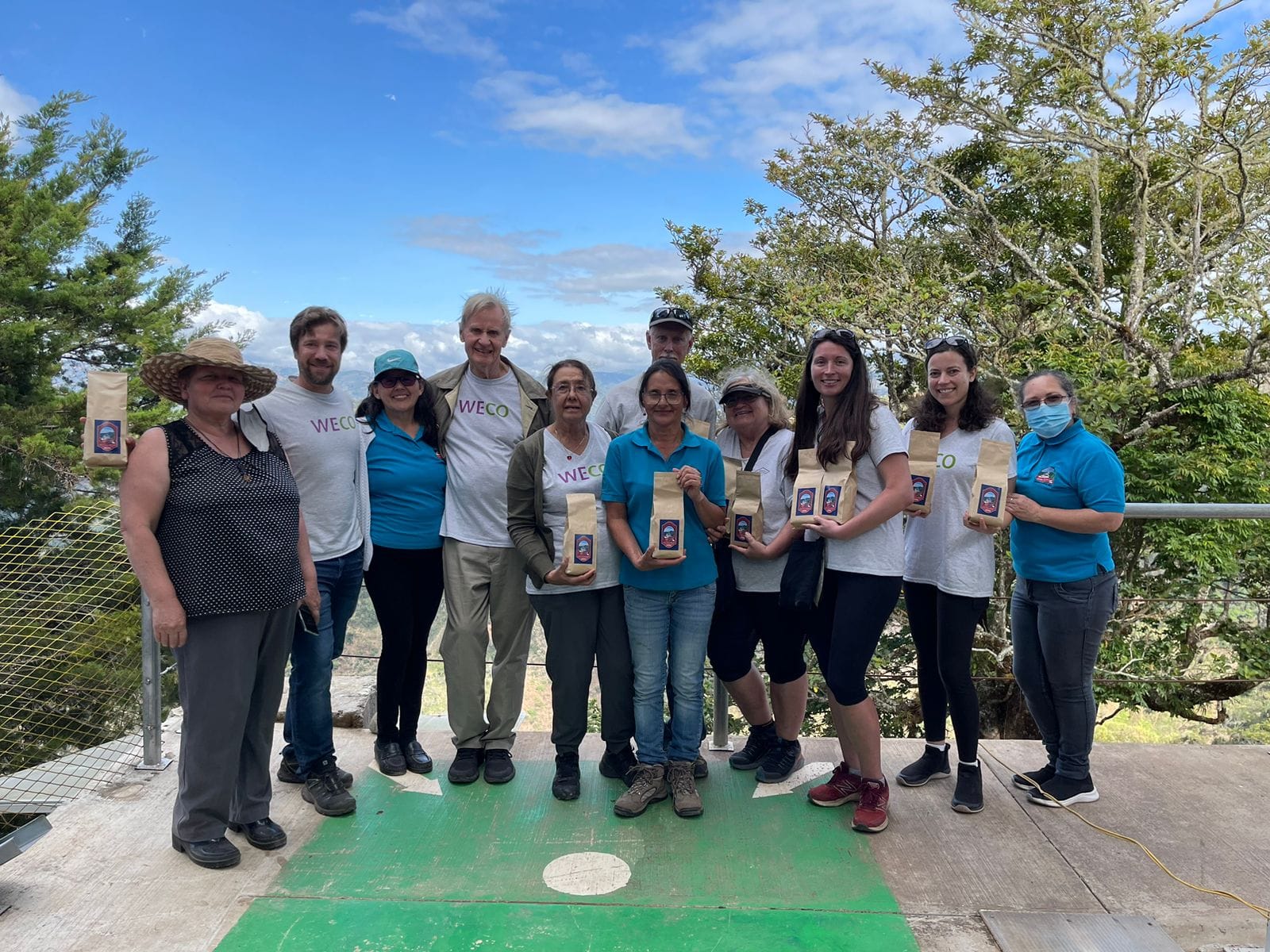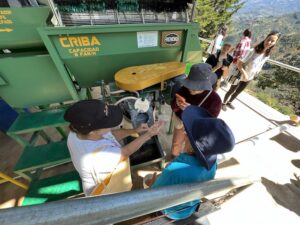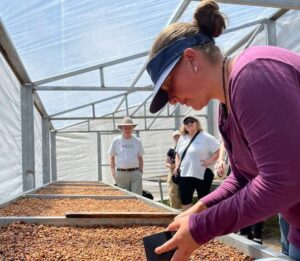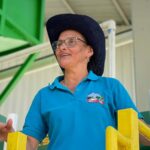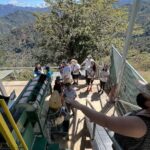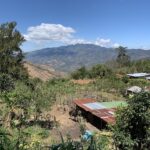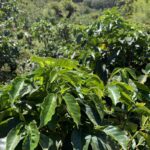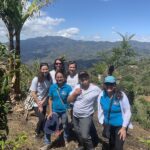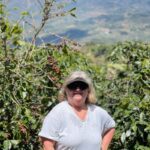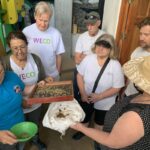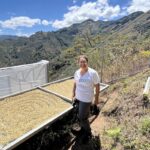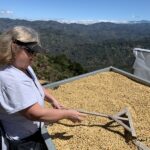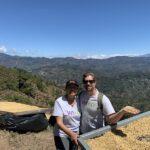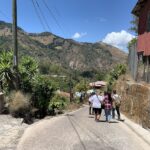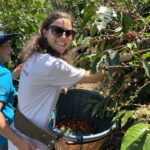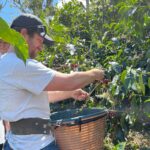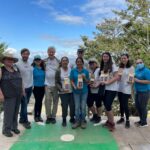Our recent visit with women-owned coffee cooperative, ASIPROFE, began with a two-hour bus journey from San José to the small town, La Legua de Asseri, winding through the beautiful mountain landscapes of Costa Rica’s premium coffee-growing region, Tarrazú. Getting to the village involves navigating the curvy, steep roads with little signage, along streets lined with coffee plants and a variety of tropical flowers. Our driver for the day was Carolina, the founder and chief operator of Enjoy 506, a women-led tourism organization that provides a number of tours and transportation options for travelers. She was kind and conscientious—simply the best tour guide and driver—and we highly recommend her services!
Once we reached La Legua, our group took a brief look around at the micromill facility before diving in to our full tour. It was amazing to see the completely constructed mill in person. We hadn’t been to visit ASIPROFE since August of 2021, and it was so impressive what the women have been able to achieve since then. It was amazing to see the completely constructed mill in person. As we ran through introductions, we learned about some of the challenges the women have faced over the past two years. Coffee producers around Costa Rica are still struggling to bounce back from the pandemic. The effects of the steep decline in tourism and and related work remain. In total, they experienced a 75% loss of income in 2021. Furthermore, due to cheap labor costs of coffee farming in Asia, and an increase in global supply, coffee prices have fallen, which has resulted in ASIPROFE receiving only two-thirds the expected revenue from their last two harvests.
Despite these obstacles, the women of ASIPROFE told us how they’ve been carefully planning for the future, working tirelessly to keep their organization alive and on a path to prosperity. After spending a day with them, our group saw firsthand the perseverance and physical stamina required to keep this operation going.
From Plant to Bean
Producing coffee is an intricate process, from cultivation and harvesting to processing and roasting it, there are many steps before the beans are ready for consumption. This multi-step endeavor involves incredibly hard work, patience, and attention to detail. It begins by understanding the necessary ingredients to grow a healthy coffee plant, such as using the proper fertilizer, pruning the larger or older plants, and monitoring temperature and rainfall.
Margoth, the president of ASIRPOFE, told our group how important it is to use the best fertilizer as it boosts the quality of the coffee cherries. Her team composts the organic waste from byproducts of production, along with old coffee plants and banana trees to enrich the soil. In this way, nothing goes to waste; they use absolutely everything. ASIPROFE grows a hybrid variety of coffee that is a blend of robusta and arabica, making the beans more resilient and resistant to variable weather patterns and higher temperatures, and also strengthens their defenses against pests and disease.
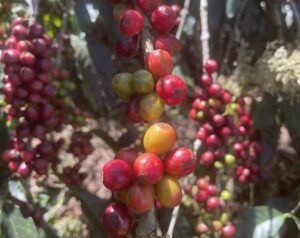
As the coffee plants begin producing their fruit (called “cherries”), they mature from green to yellow to orange and finally into a dark red. Once they take on this deep reddish color, the harvest begins—a laborious few weeks of collecting the ripened fruit. This stage is especially challenging due to the hilly landscape of their crops and involves navigating steep slopes.
Once the cherries are gathered from the plants, they are taken to the mill and initially processed through a de-husking machine that separates the bean from the outer layer. This is a nuanced step where the fresh beans pass through different chambers to be stripped, cleaned, and sorted so that only the highest quality beans are collected. ASIPROFE takes the waste from this de-husking process and composts it to fertilize their soil. This also helps keep the processing area clean as the byproduct, when it ferments, is often smelly and can attract pests.
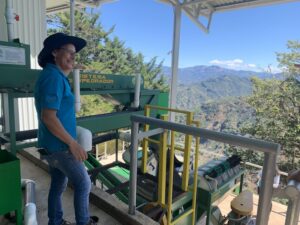
Next, the beans are laid out to dry for around 12 days in drying beds that have mesh bottoms to pull the bulk of the moisture out of the beans until they reach an optimum level. ASIPROFE currently has one greenhouse that protects a portion of beans from rain, and has plans to protect the remaining beds by building additional greenhouses in the future, so all the beans will be under a roof with proper ventilation. The remaining beans dry under the sun uncovered with tarps nearby to safeguard them in the event of bad weather.
We were intrigued to learn how the women feel connected to coffee with all of their senses and are so connected to the various stages of coffee. During this phase, they told us about the “music of coffee,” whereby they notice a shifting tone as the beans lose their water weight. They spend hours each day raking and spreading the beans under the sun to give them even exposure and have become so in tune with their sound.
When the beans reach a certain humidity, determined using a special measuring tool, they are transferred into grain bags where they are stored for at least three months. This is an important period of rest for the beans as the intensive processing up to this point creates a lot of change or “stress” for them from which they must recover. We jokingly referred to this phase as the spa period for the beans!
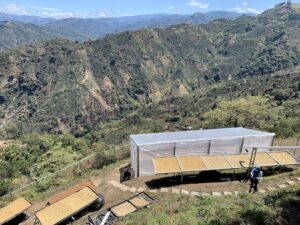
After the resting stage, there is another processing step done to remove three additional layers of skin before sorting them by weight. The sorting is first performed by a machine that uses airflow to separate beans by their weight, and then once more by hand, to ensure again that only the finest quality coffee beans move forward in the process. The women manually sift the green beans that come out of this final processing phase to ensure they are the same weight and size so that they will have a uniform toast in the roaster. Margoth described the roasting stage as the artistic part of the process. This is where she monitors temperature and roasts the beans to a uniform color from yellow, to light brown, to a perfectly roasted dark brown color. ASIPROFE does both medium and lighter roasts depending on what their client prefer.
As our tour came to a close, we were fortunate to sample some of their medium roast blend, made using a specialty coffee machine they had recently won in a contest. What’s incredibly unique about ASIRPOFE’s operation is how they not only grow, harvest, and process the beans in-house and in-country, but they also roast and sell it themselves. They truly do it all! Additionally, their coffee is grown at a high elevation, making it some of the highest quality coffee available in the region.
Amplifying Wealth and Opportunities
Equally impressive is how low-impact their operation is, existing in concert with the natural world. Throughout our visit, ASIPROFE emphasized the importance of the process to them personally, of putting love and energy into an outcome that produces quality, ultimately for the benefit of their families and communities—their local ecosystem. They strive to keep jobs in the community and are working to motivate their children and grandchildren to help them keep value in the community by joining their growing business. As coffee prices have dropped globally, managing the cost of production on the farms has also been essential for them to stay in business. For instance, by using organic soil and compost as fertilizer, they aren’t relying on purchasing chemical fertilizer as many other producers do. Having the micromill likewise reduces production costs as it greatly decreases the amount of time it takes for the women to process the beans. What the mill can accomplish in two hours used to take them three days of labor.
Throughout our tour, Margoth and the ASIRPOFE team also highlighted how collective power helps them safeguard the essence of being coffee producers, and allows them the capacity to be innovative and entrepreneurial, helping them adapt to evolving challenges. They are brought together by their common enthusiasm for finding new solutions to the problems facing women coffee producers, and a desire to leverage their potential in sustainable ways. The intricate process of their operation—while more labor intensive—creates a higher quality product and lays the foundation for a sustainable business, giving them an edge over cheaper labor coffee producers.
Many of the women haven’t completed secondary school, and yet they have been and remain eager and open to learning. While time is still a precious commodity for them, ASIPROFE expressed how excited they are to participate in trainings and workshops so they can continue to hone their craft. In more than one way, they’ve had to learn on the job, and they continuously take advantage of learning opportunities they come across through their partnership with Bean Voyage. Bean Voyage helps the women coordinate with institutions in Costa Rica and provides them with greater access to grants, loans, trainings, and other resources.
Additionally, Bean Voyage works with ASIPROFE in communicating directly with exporters, buyers, and consumers, for equitable market access. Bean Voyage will continue to support ASIPROFE in exploring different options for getting loans from the government and related institutions so they can scale their operation. They’re currently applying for a certification seal translated as “Rural Pride”—which is recognized at the national level—that will give them greater credibility. Through an extensive application process requiring 59 different criteria to be met, this seal will allow the association to have more exposure to buyers and qualify for more aid.
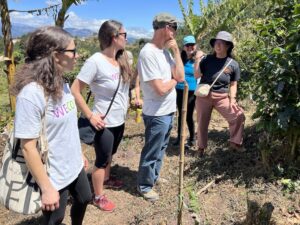
Currently, ASIPROFE is seeing high demand for their coffee. As a next step for their business, they’re looking for funding to purchase coffee beans from other local producers to process at their facility in La Legua. They estimate they can process 10 times their current volume, which would mean huge gains for the association, their families, and the entire community. Once they find their equilibrium point for the volume of coffee they can process each year, the association will be able to understand their internal capacity and create a more sustainable business plan.
In terms of environmental sustainability, they’ve also expressed interest in investing in eco-friendly operations such as better irrigation, greenhouses, and beekeeping. Further down the road, ASIPROFE envisions building a cafeteria and office space that will enable them to provide hospitality options to visitors, including farm tours and coffee tastings.
To learn more about this project, please watch our video overviewing this visit.
To get more involved in our work, reach out to us here.
